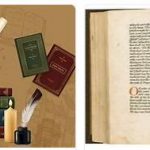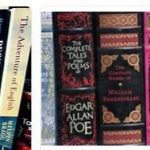
English literature, designation of English-language literature from Great Britain and the former British colonies.
The literature of the USA, the American literature, however, was seen in the 19th century as a separate division, and in the Irish literature was in the course of Irish Renaissance end of the 19th century brought the claim to a separate identity. Since the end of World War II, decolonization, worldwide migration and globalization have changed the face of English-language literature and, at the same time, our concept of English literature more and more profoundly than ever before. Nationalliterature originated in the former British colonies in English, which were soon considered to be as independent as American and Irish literature. In Great Britain, Scottish and Welsh literature developed analogously, and in England itself a living literature of ethnic minorities has emerged, written by members of the second and third generation of immigrants. The picture is further complicated by the considerable number of authors who are at home in several English-speaking countries. On the one hand, these tendencies towards differentiation and globalization have led to the development of new terms: the literatures of the former British colonies were initially referred to as » Commonwealth literature «, Whereas today we speak of» New English Literatures «or» Postcolonial Literature «. On the other hand, the term “English literature” – especially with a view to developments since the middle of the 20th century – must be used in a narrow sense and differentiated from “literature in the English language”.
The rough breakdown of English literary history follows the historical language levels: a distinction is made between Old English (7th – 11th centuries), Middle English (12th – 15th centuries) and newer (sometimes also: modern) English literature. The more recent English literature itself is often broken down into centuries; One likes to orientate oneself also on historical epochs (eg »Elizabethan Age«), cultural or intellectual history currents (eg » Humanism «, » Romanticism «) or art styles (eg » Classicism «).
Old English literature
When the Angles, Saxons and Jutes settled Britain in the 5th century, they brought their own orally transmitted literature with them, from which short runic inscriptions and later recorded heroic poems, elegies, memorabilia, blessings, magic and riddles testify. A written culture only developed in the course of Christianization (from 597); the works of important scholars such as Aldhelm († 709), Beda († 735) and Alcuin († 804) from the 7th and 8th centuries) were however written in Latin. Oral vernacular poetry lived on during this time; Christian themes and motifs were increasingly appearing in it.
Oral literature was not recorded until the late 10th century in the scriptoria of the monasteries. The most important texts are preserved in four West Saxon manuscripts (“Beowulf Manuscript”, “Junius Manuscript”, “Exeter Book”, “Vercelli Book”). It is consistently a stick rhyme seal; the style is based on the oral presentation and is formulaic, rich in variations and images. The earliest surviving example is the nine-line hymn of creation by the Northumbrian monk Caedmon († around 680). Heroic biblical paraphrases that have come down in later West Saxon versions (“Genesis”, “Exodus”, “Daniel”) are likely to come from the same circle. As the author of biblical and hagiographic epics (e.g. “The fates of the apostles”), Cynewulf(around 800 ?) Is best known. The “Beowulf” epic, which was orally handed down for centuries and which was also not recorded by monks until around 1000, is unique in old Germanic literature and merges Germanic myths with Christian values and influences from Virgil’s ” Aeneid «. Other heroic songs have hardly survived, except for a fragment of the “Finnsburg song”, of which there is also a summary in the “Beowulf” epic, as well as later historical event songs about the battles of Brunanburh (937) and Maldon (991). The monological » Elegies « of the Exeter book (including »The seafarer«, »The wanderer«) are closely related to the heroic songs in terms of themes and motifs.
The old English prose literature was promoted in the second half of the 9th century by King Alfred, who among other things. Translated Latin works by the church fathers and had the annals collection “The Anglo-Saxon Chronicle” edited. Also Orosius ‘ World Chronicle and Bede’s “Historia ecclesiastica gentis Anglorum” were translated into Old English. In the 9th and 10th centuries, larger parts of the Bible were translated for the first time; In Ælfric’s and Wulfstan’s sermons the development of a rhythmic, rhetorically sophisticated prose can be observed.
Modern English literature
According to justinshoes.net, modern English literature is often divided into the following epochs: early modern times (Renaissance, Humanism, Reformation, Elizabethan Age, Civil War and Puritan Interregnum); Restoration Period, Enlightenment, Classicism and Pre-Romanticism; Romanticism (around 1780 to around 1830); Victorian era (around 1830–1914/18); classical modern (between the world wars); Post War Literature and Postmodernism. The beginnings of modern English literature coincide roughly with the end of the Wars of the Roses, as in 1485 the Tudor dynasty came to power and political conditions began to stabilize. The development of literary life was favored by the social and economic rise of the middle classes – the bourgeoisieand the lower land nobility – as well as by the boom in the book market as a result of the invention of the printing press and the increasing standardization of the English language.







